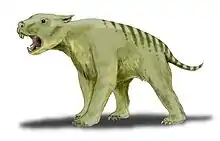| Wynyardiidae Temporal range: | |
|---|---|
| Scientific classification | |
| Domain: | Eukaryota |
| Kingdom: | Animalia |
| Phylum: | Chordata |
| Class: | Mammalia |
| Infraclass: | Marsupialia |
| Order: | Diprotodontia |
| Infraorder: | Vombatomorphia |
| Family: | †Wynyardiidae Osgood, 1921[1] |
| Genera | |
|
Wynyardia | |
Wynyardiidae is an extinct family of possum-like marsupials from the early Miocene of Wynyard in Tasmania, long been considered to display skeletal features that are intermediate between the primitive polyprotodont and the advanced diprotodont marsupials.
Wynyardia's brain is clearly phalangeroid in external morphology, resembling closely that of the extant phalangerid Trichosurus vulpecula. This indicates that by 21 million years ago, an unambiguously phalangerid brain had evolved within the Diprotodonta family, indicating that both groups had a common ancestor prior to this date. Research on Wynyardia bassiana's relationship with fossil phalangerid species of the Miocene is an ongoing process.
Species
- †Wynyardiidae (Osgood 1921)
- †Wynyardia bassiana (Spencer 1901)
- †Muramura williamsi (Pledge in Archer 1987)
- †Muramura pinpensis (Pledge N S 2003)
- †Namilamadeta snideri (Rich & Archer 1979)
Notes
- ↑ Osgood, W.H.; Herrick, C.J. (1921). "A monographic study of the American marsupial, Caenolestes". Field Museum of Natural History, Zoological Series. Field Museum of Natural History. 14 (1): 138.
References
- Wildlife of Gondwana, By Patricia Vickers-Rich and Thomas Hewett Rich 1993 ISBN 0-7301-0315-3 Reed.
External links
This article is issued from Wikipedia. The text is licensed under Creative Commons - Attribution - Sharealike. Additional terms may apply for the media files.

.jpg.webp)